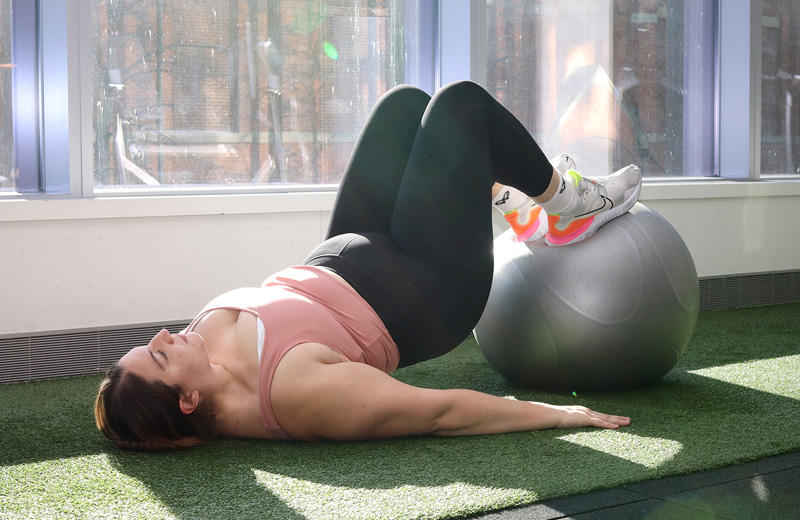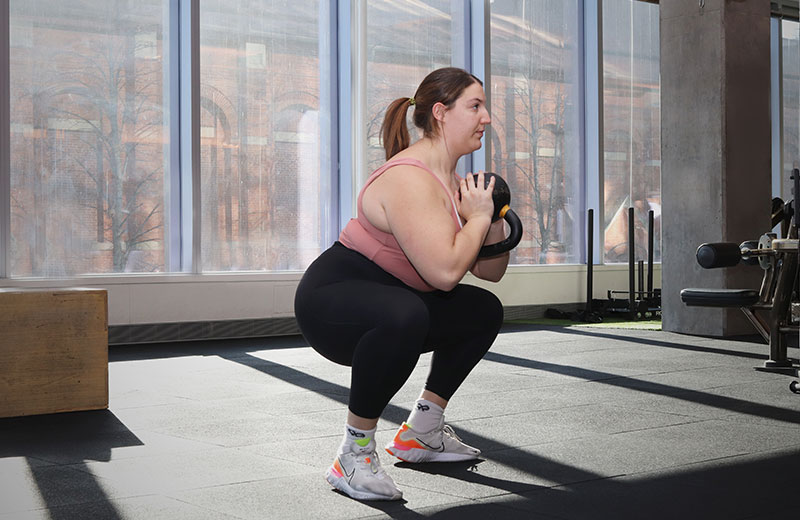Personal Trainer
NASM CPT
Introduction
Exercising during pregnancy presents many amazing benefits to both mom and baby. While exercise during pregnancy is safe, it’s important to know what exercises are recommended, and what modifications you should be mindful of. We’re going to take a deeper dive into prenatal exercise do’s and don’ts, what exercises are safe to do, and how it contributes to a healthy mom and a healthy baby.
It’s important to note, this article is designed for educational purposes only. Please consult your healthcare team prior to initiating exercise during pregnancy to discuss what is most appropriate for you and your baby.
What are the Benefits of Exercising while Pregnant?

Prenatal exercise is safe and beneficial for both mom and baby. In fact, staying active during pregnancy is not only highly recommended by healthcare professionals, but can help your body be better equipped for the demands of pregnancy and labour.
For Mom
Pregnancy is an amazing experience but is no doubt challenging on your body. Regular exercise can help ease the discomfort caused by all the physical changes during pregnancy. It can help reduce common pregnancy symptoms such back pain, and constipation, decreases your risk of gestational diabetes, preeclampsia, and cesarian delivery. Exercise promotes healthy weight gain throughout your pregnancy and strengthens your heart and blood vessels as well as your overall general fitness. Staying active prepares your body to give birth by helping to strengthen the muscles needed for a smooth delivery. Reduced pushing time is an additional benefit, as longer births can be more traumatic for mom and baby. The fitter you are, the shorter the pushing time may be.
For Baby
Knowing the benefits of prenatal fitness for moms is one thing, but do you know the benefits it has to your baby too? In a recent study published in Medicine & Science in Sports & Exercise, looking at how aerobic exercise affects neuromotor development of 1-month-old offspring, it was concluded that exercising during pregnancy doesn’t just help the mom, but also the baby. The study took 71 healthy pregnant women aged 18-35 and assigned them randomly to either aerobic exercise intervention or no exercise (the control group). Women in the exercise group performed 50 minutes of moderate intensity supervised aerobic exercise three times/week. Those in the control group maintained their usual activity. Infants of women in the exercise group had higher PDMS-2 (Peabody Developmental Motor Scales) scores on four of the five variables analyzed relative to infants of non-exercisers. The PDMS-2 measures six interrelated motor abilities of children including reflexes, stationary, locomotion, object manipulation, grasping, and visual-motor integration.
Although exercising during pregnancy is not always easy – requires self-motivation, discipline and mental strength – it’s not only empowering, but also ensures both mom and baby are happier and healthier.
Is it Safe to Exercise During Pregnancy?

If you are in good health and are having a healthy pregnancy, it is perfectly safe to continue or start exercising. Many of the false assumptions made about prenatal exercise are outdated. Physical activity will not increase your risk of miscarriage, low birth weight, or early delivery. However, because every pregnancy is unique, there are some cases in which women should not exercise during pregnancy.
Women with the following conditions or pregnancy complications should not exercise during pregnancy unless they receive specific instruction and clearance from their healthcare provider:
- Certain types of heart and lung diseases
- Cervical cerclage
- Being pregnant with twins or triplets (or more) with risk factors for preterm labor
- Placenta previa after 26 weeks of pregnancy
- Preterm labor or ruptured membranes (your water has broken)
- Preeclampsia or pregnancy-induced high blood pressure
- Severe anemia
What Type of Exercises Can I do During Pregnancy?

While it’s a myth that you shouldn’t exercise while pregnant, it is true there are certain exercises to avoid. If you are a healthy individual, having a healthy pregnancy, you can continue to do whatever exercise you were previously doing, including weightlifting, you just may need to make modifications as your baby grows. Ideally, pregnant women should get at least 150 minutes of moderate intensity aerobic activity per week. This means moving enough to get your heart rate up to a moderate pace (about 50-60% higher than your resting heart rate), such that you are still able to hold a conversation while exercising. Examples of moderate intensity aerobic activity include brisk walking, swimming, water aerobics and gardening. You can divide the 150 mins however best suits you and your lifestyle, whether that is 3-5 times/week doing longer stretches of activity, or 15, 10 minute walks throughout the day. If you are new to exercise, start slowly and gradually work your way up. Start with 5 minute walks throughout the day and work up to being able to do 30 mins at a time.
Exercises that should be avoided during pregnancy, according to the American College of Obstetricians and Gynecologists include:
- Sports that will put you at a higher risk of injury such as contact sports, ice hockey, boxing, soccer, and basketball
- Skydiving
- Activities that may result in a fall such as downhill skiing, water skiing, surfing, off road cycling, gymnastics, and horseback riding
- Hot yoga or hot Pilates which may cause you to become overheated
- Scuba diving
How Will My Changing Body Affect My Workouts?
Between weight gain, hormonal side effects, and your growing belly, your body undergoes many changes during pregnancy. It’s important to be mindful of these changes and how they may impact your exercise routine.
Joints

The hormones made during pregnancy cause the ligaments that support your joints to become relaxed. This can make your joints more mobile, or even hypermobile and cause risk of injury. Avoid jerky, bouncy, high-impact motions, or movements where there is the potential for instability around a joint, that can increase your risk of injury.
Balance

With your belly getting bigger, this will change your center of gravity. This places stress on joints and muscles, especially those in your pelvis and lower back. Your changing center of gravity also increases your risk of falling. Due to this, there are some movements that should be avoided such as high-impact exercises like jumping.
Breathing

When you exercise, oxygen and blood flow are directed to your muscles and away from other areas of your body. While you are pregnant, your need for oxygen increases. This may affect your ability to do strenuous exercise, and you may need to take longer and more frequent rests during your workouts. Signs you may need a rest include increased resting heart rate, fatigue, feeling lightheaded and/or dizzy, nausea, and any irregularities in your body. It’s important to always listen to your body and adjust the intensity of your exercise as needed.
What are the Warning Signs I Should Look Out For?
Whether you’ve been exercising for 1 month or 10 years, it’s important to watch out for the following warning signs while exercising. If you do experience any of these, stop exercising and consult with your obstetrician or other healthcare provider.
- Bleeding from the vagina
- Feeling dizzy or faint
- Shortness of breath before starting exercise
- Chest pain
- Headache
- Muscle weakness
- Calf pain or swelling
- Calf pain or swelling
- Regular, painful contractions of the uterus
- Fluid rushing or leaking from the vagina
Conclusion
Exercising during pregnancy is safe and beneficial with guidance and support from your trainer and medical team. Lifting weights, as well as moderate-intensity physical activity, are beneficial for you throughout your pregnancy. With any workout, it’s important to listen to your body and always consult your healthcare team prior to starting a new exercise program. Make sure you are clear to exercise, no matter what stage of pregnancy you’re in.
Begin Your Journey with Us
If you’re finding it challenging to get started on your journey, feel free to reach out to us for a complimentary consultation. We would be more than happy to offer some guidance to help you move forward. Sometimes taking the first step is the hardest, so don’t hesitate to get some help to kickstart the process. We all start somewhere.

